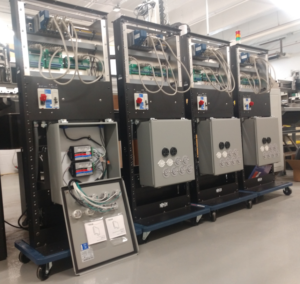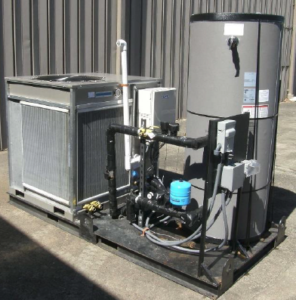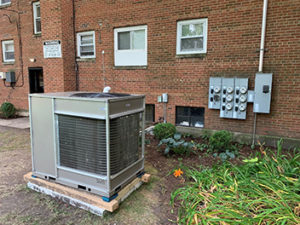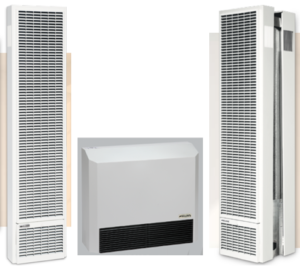GTI Energy is addressing key challenges in bringing new technologies related to high-efficiency space heating and water heating systems. This includes natural gas heat pumps and combined space and water heating systems – and the integration of these systems into homes and commercial buildings.
Results from Gas-Fired Heat Pump Demonstrations and Research Across Multiple Sectors
2021 ETCC Webinar Series - June 24, 2021
Project Highlight:
Quantifying potential energy, emissions, and cost savings for heating equipment in a variety of settings with GTI Energy’s Load-Based Testing (LBT) method
 Conventional field pilots are valuable to understand how energy efficiency equipment performs in the real world, but it requires extensive time and effort to collect the data. To provide a snapshot of real-world performance and assess the energy savings potential of a suite of efficiency measures targeting low-load homes, GTI Energy developed a novel Load-Based Testing (LBT) method to determine as-installed performance of appliances such as emerging low-capacity space and water heating systems and furnaces.
Conventional field pilots are valuable to understand how energy efficiency equipment performs in the real world, but it requires extensive time and effort to collect the data. To provide a snapshot of real-world performance and assess the energy savings potential of a suite of efficiency measures targeting low-load homes, GTI Energy developed a novel Load-Based Testing (LBT) method to determine as-installed performance of appliances such as emerging low-capacity space and water heating systems and furnaces.
The method integrates multiple test rigs and associated algorithms selecting representative peak and average days in winter and summer to simulate real-world conditions in a controlled laboratory environment. GTI Energy is using this approach to evaluate gas and electric equipment across a wide range of as-installed conditions. This holistic approach—characterizing performance in the laboratory with the LBT, quantifying savings through modeling, and then validating the savings in the field—provides a comprehensive understanding of performance that can be used to assess energy impacts for low-income, single-family, and multifamily housing applications. The LBT provides a condensed schedule for demonstrations that has helped accelerate technologies to market.
Project Highlight:
Bringing low-cost gas-fired heat pump (GHP) technology to high-efficiency homes
Natural gas is the preferred fuel for thermal comfort in North America, and gas heat pumps offer simple efficiencies of more than 100%.
GTI Energy along with various strategic partners like Trane, Rinnai, Stone Mountain Technologies, and others, are developing advanced natural gas heat pump solutions that can be used for space heating, water heating, and combination space and water heating products. These represent next-generation solutions for efficiently using natural gas and achieving greenhouse gas emission reductions.
Project Highlight:
Showcasing gas-fired heat pump (GHP) technology for water heating and air-conditioning in restaurants
 Gas-fired heat pumps can bring notable savings to commercial businesses. There are several projects underway and one recently completed collaborative effort led by GTI Energy with the California Energy Commission and several key industry partners demonstrated an integrated Ultra-Low NOx GHP system for water heating and space cooling at two full-service restaurants in the greater Los Angeles basin. Installed in new-construction or as a retrofit to an existing commercial water heating system, the integrated GHP system shows high potential for cost-effective energy savings and greenhouse gas emissions reductions.
Gas-fired heat pumps can bring notable savings to commercial businesses. There are several projects underway and one recently completed collaborative effort led by GTI Energy with the California Energy Commission and several key industry partners demonstrated an integrated Ultra-Low NOx GHP system for water heating and space cooling at two full-service restaurants in the greater Los Angeles basin. Installed in new-construction or as a retrofit to an existing commercial water heating system, the integrated GHP system shows high potential for cost-effective energy savings and greenhouse gas emissions reductions.
California Energy Commission Project: Demonstration and Assessment of Natural Gas Heat Pumps for Integrated Water Heating and Air-Conditioning in Restaurants
Project Highlight:
Demonstrating residential gas heat pump water heaters
A latest generation gas-fired heat pump water heater (GHPWH) has been tested at different U.S. field test sites, including a major effort in California in collaboration with Southern California Gas and the California Energy Commission. This novel technology can meet Ultra-Low NOx requirements and has a projected Uniform Energy Factor (UEF) that is more than twice that of standard gas water heaters. It offers the lowest operating cost and cost of ownership, with projected 50% energy savings.
California Energy Commission Project: Demonstration and Assessment of Residential Gas-fired Heat Pump Water Heaters in the Los Angeles Basin
Project Highlight:
Overcoming barriers to large-scale GHP implementation with the North American Gas Heat Pump Demonstration Program
Gas heat pumps are gaining traction in residential and commercial sectors, with an uptick in various pre-commercial installations. GTI Energy is supporting the development of a family of gas heat pump technologies to lower energy consumption, reduce energy costs, and minimize environmental footprint, with a focus on heating in residential buildings.
Numerous RD&D activities to verify equipment durability and performance and provide consumers with knowledge and confidence to buy have been undertaken.
GTI Energy is managing a coordinated effort with utility partners across Canada and the United States to demonstrate a new residential pilot for the 2024-2025 heating season.
 Through GTI Energy’s Emerging Technology Program (ETP), we are conducting a large-scale demonstration of a residential GHP system across 10 regions to serve as a launching pad for market adoption. Building on years of collaborative R&D, the North American Gas Heat Pump (GHP) Demonstration Program will demonstrate more than 75 units in the field to help overcome technical and market barriers to large-scale GHP implementation. A collaborative approach allows our utility partners to share data and lessons learned to amplify impact and drive market transformation.
Through GTI Energy’s Emerging Technology Program (ETP), we are conducting a large-scale demonstration of a residential GHP system across 10 regions to serve as a launching pad for market adoption. Building on years of collaborative R&D, the North American Gas Heat Pump (GHP) Demonstration Program will demonstrate more than 75 units in the field to help overcome technical and market barriers to large-scale GHP implementation. A collaborative approach allows our utility partners to share data and lessons learned to amplify impact and drive market transformation.
Detailed performance data will be collected in the field and combined with lab testing and energy modeling to create a robust analysis to support the development of energy efficiency and market transformation programs across the U.S. and Canada. The controlled demonstrations will support the creation of regional markets through distribution channel development and installer training and support. The program includes qualitative assessments, examining the installation and commissioning process in detail along with user experience, comfort, and satisfaction. This program is a major step towards the creation of a sustainable thermal heat pump market.
- Summary of Recent Demonstrations: Thermally-Driven Heat Pump Combis—December 2021
- Thermal Heat Pumps – The Time is Now! – ACEEE Summer Study on Energy Efficiency in Buildings — August 2020
- Pathways to Decarbonization of Residential Heating — International High Performance Buildings Conference 2021
- Results from the Demonstration of GHP “Combi” Systems in the Upper Midwest — 2019 ACEEE Hot Water Forum Presentation March 13, 2019
- Pre-Commercial Scale-Up of a Gas-Fired Absorption Heat Pump — DOE EERE, Building Technologies Office June 17, 2020
- The Gas Heat Pump Technology and Market Roadmap
Project Highlight:
Advancing codes and standards for next generation fuel-fired equipment
The GTI Energy team is also active in modernizing industry codes and standards, improving the accuracy of building energy modeling tools, and reducing installation barriers through innovative controls and infrastructure solutions.
The CEESM Residential Heating and Cooling Systems Initiative harmonizes binational program approaches by supporting the production and adoption of high efficiency and connected equipment in the market, implementation of installation and maintenance guidance, and facilitation of program opportunities aimed at selection of the appropriate heating and cooling system solutions for each unique customer.
GTI Energy assisted with the development of the most recent Natural Gas Equipment Specifications released in January 2021 by CEE. It covers residential central air conditioners, air source heat pumps, gas furnaces, gas-fired boilers, gas heat pumps, and connected thermostats.
Project Highlight:
Demonstrating hybrid gas/electric space conditioning system in high-performance homes
GTI Energy conducts field evaluation projects to assess the benefits of low-capacity natural gas furnaces and electric heat pumps in high-performance homes. This work often includes funding support from local electric and gas utilities with efforts at multiple sites. These demonstration projects of the hybrid space conditioning system are in retrofit applications in both market-rate and income-eligible homes. They have resulted in validated energy savings over the heating and cooling seasons.
Project Highlight:
Tackling Residential Space Heating Opportunities and Challenges
In a 2022 report, GTI Energy examined the current state of space heating energy use and assessed the impacts should space heating across the U.S. be electrified. The results are now available in an interactive data viewer that explores the state-by-state impacts on GHG emissions and annual heating costs for an average single-family home, and on peak electricity demand across the state.
Project Highlight:
Improving the Performance of Wall Furnaces in California
 Wall furnaces are prevalent in California’s single-family homes and low-rise multifamily residential buildings as primary or auxiliary sources of heating, but many have low thermal efficiencies. A recently completed California Energy Commission shows high potential for cost-effective energy savings by replacing older existing wall furnaces with more efficient advanced retrofit models that can reduce emissions and improve indoor air quality.
Wall furnaces are prevalent in California’s single-family homes and low-rise multifamily residential buildings as primary or auxiliary sources of heating, but many have low thermal efficiencies. A recently completed California Energy Commission shows high potential for cost-effective energy savings by replacing older existing wall furnaces with more efficient advanced retrofit models that can reduce emissions and improve indoor air quality.
Learn More
Contact the energy experts today
